I’ve been reading about the impact of Donald Trump’s “anti-war” message in the 2016 election campaign, and I’m only now beginning to make sense of it. Trump is obviously no pacifist: he repeatedly advocates violence as a solution to global problems, often extreme violence.
But by opposing the Iraq War—or rather, by claiming to have done so from the start—Trump staked out an unusual position for a right-wing candidate. This should have been a liability: how can a Republican run so far from the party’s last president, much less hold that position against a Democratic critique? Yet it was enough to give Trump a victory.
The only way I’ve been able to cut through it is by looking at John Rambo, and the complex critique of the Vietnam War in First Blood and its sequels, even as they lionized the consummate American soldier. Rambo offered a vision of America so contrary to Marvel’s Steve Rogers, that it’s easy to forget that the two protagonists tread very similar paths.

By centering Captain America, rather than Rambo, as the ultimate American warrior, I missed the potency and dangers of Trump’s argument. And not for nothing did Chris Evans back Hillary, while Sylvester Stallone sided with the president-elect.
Rambo debuted in a movie that did not bear his name, 1982’s First Blood. Released only seven years after the American withdrawal from Vietnam, it picked at wounds that were still incredibly raw. The movie is set in the small town of Hope, Washington, where John Rambo has washed up in his aimless wanderings after his discharge. He suffers from severe PTSD from his time in the service, and other health issues from his exposure to Agent Orange, a chemical weapon deployed by the United States. His haggard condition leads to his arrest for vagrancy—the former Green Beret is indistinguishable from a bum. While he is harassed by the police, he has a flashback to his time in a POW camp in North Vietnam, fights the officers, accidentally kills one, and escapes into the woods. He is never captured, but is ultimately persuaded to surrender by his former commanding officer, Col. Sam Trautman, who is the first person to listen and empathize with Rambo’s intense wartime traumas and struggles in returning to civilian life. Sobbing and exhausted with grief, Rambo turns himself in. The hero ends the movie in jail, his story complete (the ending initially had Rambo commit suicide).
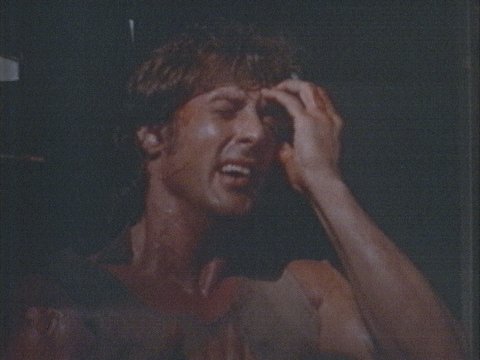
The origin story of Rambo, then, is not heroism, but trauma. His opponents are cruel, but ordinary, and his great triumph is not defeating them, but deciding to lay down his arms and surrender voluntarily. Only in the sequel, Rambo: First Blood Part II, does he become the character his name now connotes. But in both movies, he is only flexing the skills he developed long ago—we never see the first half of the story on screen, where the young, idealistic Rambo joins the army to serve his country, and completes his Green Beret training or serves honorably in Vietnam. We only see Rambo the fallen. His ideology and hopes are left unstated, and it’s easy to project anything onto him.
Three years after his arrest, Trautman returns to Rambo’s side, offering him a pardon if he will accept a mission to rescue POWs still held in Vietnam—an allusion to the pervasive myth that America abandoned soldiers at the end of the war. He accepts the mission, but is dejected to learn that he is only to be a scout who will be disavowed at the first sign of trouble. If he finds any survivors, an official extraction team will be sent in; he will be denied any personal victory. Instead, he has to trust the same authorities who abandoned him in the first place.
Naturally, he is soon betrayed by the American authorities, and so alone, he liberates a dozen POWs from Vietnamese and Soviet soldiers, before returning to base to berate the commanders who abandoned him and continue to abandon American troops. He attacks the craven CIA bureaucrat Marshall Murdock, wrecking his office and demanding that he dedicate himself to the missing.
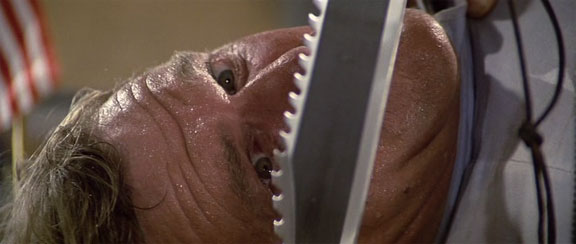
He walks off into the jungle, saying only: “I want what they want, and every other guy who came over here and spilled his guts and gave everything he had, wants! For our country to love us as much as we love it! That’s what I want!”
This is a plot arc which mirrors Captain America so directly that it feels deliberate, even though the emotional impact is exactly the opposite, because while everything goes wrong for Rambo, it goes right for Steve, after they both join the Army and become super-soldiers, either through a serum or training, to fight evil. Neither ever doubts the superiority of the United States over the Soviet Union or Nazi Germany.
Both are defined by their combat relationships with a (diverse) band of brothers, but for Steve, this means that he can rely forever on the allegiance of the Howling Commandoes; even generations later, their descendants are loyal to the Avengers. Rambo, however, loses his team in Vietnam; many face torture before their deaths, and close companion Joey Danforth dies in Rambo’s arms.
Both Rambo and Steve also lose their best friends, not to combat directly but to something more sinister. Rambo’s Delmore Barry develops cancer after being exposed to Agent Orange, while Bucky Barnes is captured and transformed into the Winter Soldier. But again, Steve’s story is happy while Rambo’s is tragic; Barry dies, Bucky is rescued and rehabilitated.
Further, Rambo isn’t the only one to rescue POWs behind enemy lines, in defiance of his orders.
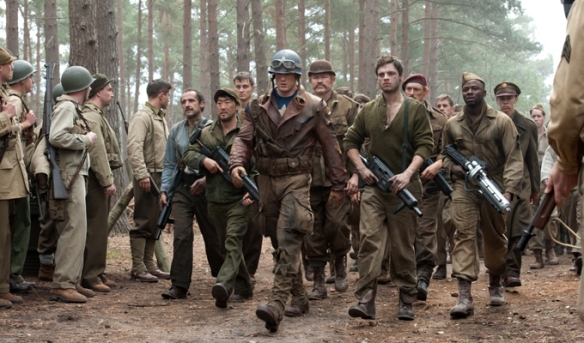
But while Rambo uses the opportunity to highlight the cowardice of his commander, Steve meets with nothing but glory:
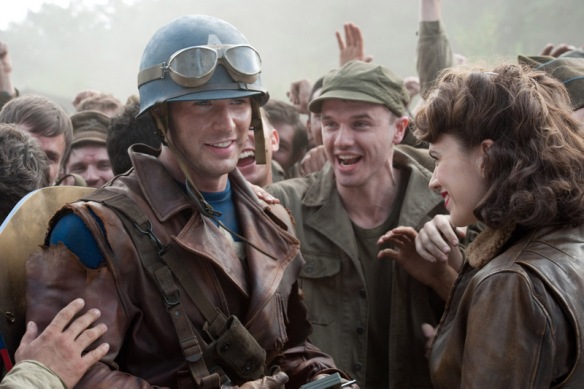
Steve gets the girl, too. Rambo’s only love interest, a Vietnamese ally named Co Bau, is killed in battle, providing only another source of rage for him, rather than relief. And when each of them has a moment of self-sacrifice, Rambo’s choice is to surrender, stopping no threat but his own, while Steve goes down with Red Skull’s plane, thereby saving the world one more time.
Because of Steve’s unfailing moral character and his nigh-invincibility, his movies don’t require asking too many difficult questions; my own doubts aside, he is even the victor of Civil War, departing from the Avengers on his own terms. The shield can remain unblemished, because its targets are so rarely human (Loki, Red Skull, Ultron) or otherwise are incorrigibly evil (Hydra). The costs of war are remote, and the causes self-evident, such that Steve is an easy hero to love. He gleams, even in his darker moments.
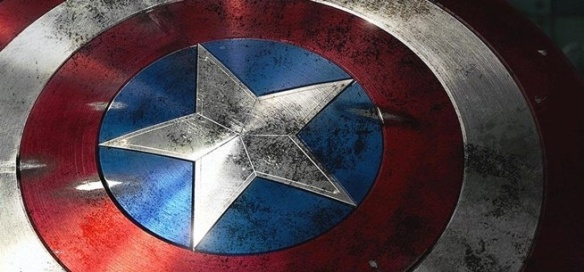
Rambo bears the costs of war on his back, cruciform, scarred and bleeding from his enemies’ blows.
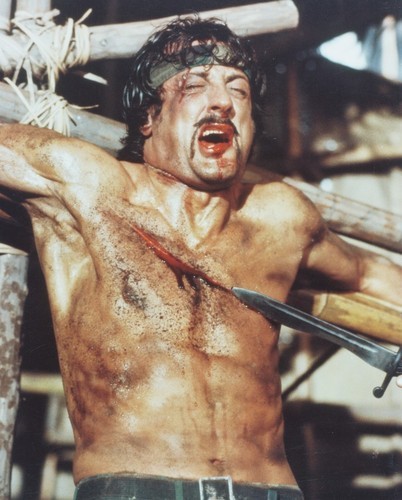
While Rambo is replete with revolting and graphic violence—in contrast to the cartoony explosions of Captain America—it does not have a pacifist message. There is no criticism of the mission in Vietnam, or of the Cold War in general. Only the execution of the war is wrong—the politicians and the generals defiled blood spilled by Americans with a million compromises and secrets. Rambo asks his commander before going back into the jungle: “Do we get to win this time?” It is an expression of solidarity with the troops, whose invincibility cannot be questioned, but can only be defeated because of cowardice or subterfuge from within. Rambo does not merely rescue POWs, but redeems them, in a holy wave of violence in the tone of Raiders of the Lost Ark. The unrestrained American soldier will always win, and in proving it to be so, that suffering is sanctified.
Returning to the present, Donald Trump was able to retain right-wing support while opposing the Iraq War by depicting his opponent as Marshall Murdock and not Tony Stark. Clinton voted for the Iraq War, and while leftists criticized that vote because of their aversion to war in general, Trump figured out how to criticize it in the context of his own belligerence. The problem was not the false intelligence on weapons of mass destruction or the other lies that led the United States into the conflict; it was the fact that American might was betrayed from within, because troops were put in a situation where they either could not win, or were not allowed to win. Trump blasted his opponents for wanting to fight a “politically correct war,” while he promised victory through extreme strength, accompanied by plunder of Iraqi oil. Iraq wasn’t wrong because it was immoral, it was wrong because it was a defeat.
Captain America can never provide that kind of redemptive violence; he will always be tempered by his earnest devotion to peace and humanity, even in a time of war. Moreover, his self-righteousness is often a flaw, not a virtue, and we are asked to see the risks of trusting Captain America far more than Rambo. As such, when his powers are restrained by the Sokovia Accords in Civil War, Tony Stark fills a similar plot role as Murdock, except he is not depicted as cowardly or treacherous. Rather, it is a conflict between friends over principle, without an easy answer.
This suggests that Clinton is Captain America, and that her defeat is equivalent to Rambo triumphing over Steve Rogers, but that’s not quite the story here. Clinton operated in a world where Cap is the icon of American ideals, whose adoration of those ideals is a moral argument in and of itself. This perhaps peaked at the Democratic National Convention, when the parents of Captain Khan took the stage, calling on Trump to honor America as they did. But it failed, not because Captain Khan and America are weak or evil, but because their hopeful idealism rang hollow. Trump, like Rambo, captured a national mood that America was failing, and needed more than simple allegiance. It needed a purge. Both Trump and Rambo promise to make America great again, not only by standing up for it, but by wreaking havoc on its internal enemies. Rambo delivers a vengeance to Murdock echoed in Trump’s chants of “lock her up”.
For Iraq veterans and their families, this was a powerful message in 2016, just as it was in 1985 for Vietnam vets going to Rambo. Trump promised invincibility: the idea that any war could be won if the soldiers were allowed to win it rather than by obeying the Geneva Conventions. Clinton’s experience in a complex world became a negative, because it just showed that she was willing to compromise when force was an option, highlighted by the Iran nuclear deal. Caution, negotiation, and diplomacy all stood in the way of a Rambo-esque redemption of the American bloodshed in Iraq. The promise of a new wave of violence, against all enemies, was inseparable from a critique of the Iraq War. Neither Steve Rogers nor Tony Stark could tell that story, and so Trump prevailed. Rambo came out of nowhere to triumph as well: the movie received almost exclusively negative reviews, and “won” a half-dozen Razzies. Yet it grossed more than $300 million, smashing box office records.
Despite the enormous emotional heft of the movie, Rambo‘s catharsis can only look back, not forward. Stallone was pressed back into action in Rambo III in 1988, where he joins a covert mission to aid local fighters against the Soviet Union. Those fighters were the mujahideen in Afghanistan, soon to become Al Qaeda. Rambo’s allies in the movie could well have included Osama bin Laden himself, then fighting the exact same fight in the same place. Bin Laden’s future could not have been known to the producers at the time; there is no intended irony as Rambo trains and collaborates with America’s next great enemy.
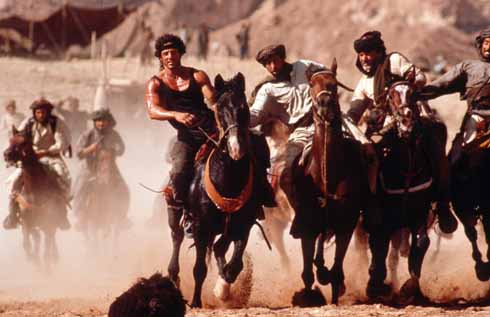
However, this only adds to the dread from watching Rambo III now. Trump, like Rambo, will only create greater threats, and he offers emotional catharsis without any real hope. We are denied the Avengers’ caution and left with Rambo’s bravado and a war critique that only ensures the next one will be worse. Rambo has become President of the United States, and it’s just as awful as it sounds.
Follow Lady Geek Girl and Friends on Twitter, Tumblr, and Facebook!
